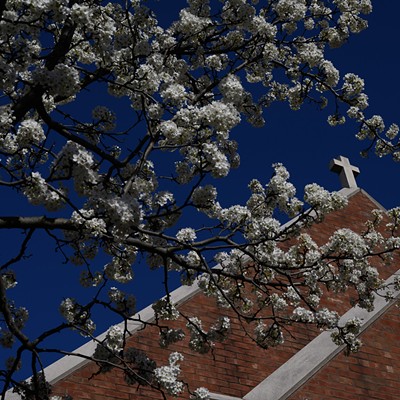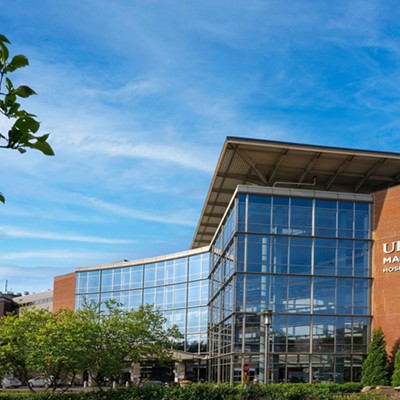"The humanities" are easy enough to define: They are "knowledge of humankind and its works," says David Shumway, head of Carnegie Mellon University's Humanities Center. Think: literature, academic disciplines like history, anthropology and philosophy, and even the life experience of everyday people.
Defining the inaugural Pittsburgh Humanities Festival might be tougher. That's the challenge facing organizers like Shumway and Pittsburgh Cultural Trust vice president of programming Paul Organisak. The festival runs March 26-29, with some two dozen events, mostly at Downtown venues.
"This is new and it's not easy new," says Organisak. After all, the Humanities Festival isn't splashy, like the giant rubber duck at the Trust's 2013 Festival of Firsts. Yet neither is it a mere series of podium lectures. Rather, it features nationally and internationally known theater artists, writers, poets, filmmakers and historians making presentations or in conversation with a moderator — and ultimately with the audience — on everything from indie cinema to the criminalization of rap lyrics, religious innovation in Pittsburgh, and the concept of "dignity." The fest's tagline is "Smart Talk About Stuff That Matters."
Bookending the four-day program are its biggest names, both at the Byham Theater: Azar Nafisi, author of the best-seller Reading Lolita in Tehran, speaks on "Humanities & The Future of Democracy" on March 26. And George Takei, actor and social-media Jedi, wraps things up March 29.
Shumway conceived the festival after hearing about the long-running Chicago Humanities Festival. Organisak was receptive, having noted the increasing popularity of post-show audience talk-backs and other supplementary programming at Pittsburgh Dance Council shows (which he programs) and other Trust events. "People come wanting more education, more conversation around what they're seeing," he says.
Moreover, the humanities fest "kind of fills a gap" in town, says Organisak, by acknowledging the increasingly blurry distinction between humanities and the arts.
The festival, in fact, includes a couple theatrical presentations. Playwright Robert Myers' Twilight Country, about a white woman and a black woman bonding over Dante's Inferno in 1948 North Carolina, will be performed by Broadway actors Kathleen Chalfant and Tonya Pinkins (March 27 and 28). And performance artist Cynthia Hopkins presents A Living Documentary, her musically driven new one-woman show about life as an artist in New York City (March 28). There's even a music component: VIA Music Festival's special March 28 show at Lawrenceville's Ballroom (above Round Corner Cantina), featuring artists from boundary-pushing Mexican music label N.A.A.F.I.
Most of the festival's core, hour-long talk-oriented sessions, meanwhile, take place on Saturday and Sunday — most of them running three at a time. A sampling: Indie-film legend John Sayles (Matewan, Eight Men Out) and his producing partner Maggie Renzie discuss the state of indie cinema with Shumway (who's written a book about Sayles). Rolling Stone contributing editor Anthony DeCurtis talks with WYEP's Brian Siewiorek about Lou Reed (whose bio he's writing) and other rock stars he's known. Former Washington Post art critic Blake Gopnik, who's working on a biography of Andy Warhol, offers "Andy Warhol: Portrait of the Artist as a Young Yinzer." Author Frances Bartkowski delivers "Kissing Cousins: Touched and Terrified by Difference," about humans' relationship with animals. Penn State theater professor Susan Russell leads a discussion about dignity. Professors Erik Nielson (University of Richmond) and Charis Kubrin (University of California Irvine) discuss the criminalization of rap lyrics.
Locally based presenters include: poet Terrance Hayes; artist and activist Vanessa German; author Kiron Skinner (on Ronald Reagan); CMU English professor Christopher Warren ("Six Degrees of Francis Bacon," about connections between people in early modern England); and CMU historians Tim Haggerty and Harrison Apple ("The History of Queer Pittsburgh").
Organisak was intent on keeping festival tickets affordable: A festival pass of $20 ($10 for students) gets you into most sessions at Downtown's Trust Arts Education Center. Selected events (including Nafisi and Takei) are ticketed separately.
For most sessions, seating is limited to 85. So even if it sells out, the Pittsburgh Humanities Festival has a long way to go to catch Chicago's. Last fall, the Chicago Humanities Festival's three-week main season hosted more than 100 events and drew about 38,000 people. The 25-year-old CHF has events year-round, including a May performance festival for young audiences.
CHF predated TED talks, Aspen Ideas Week and other popular humanities-style series. Shumway consulted with CHF executive director Phillip Bahar in preparation for Pittsburgh's festival. Bahar says the biggest key to the fest's success has been collaboration with museums, cultural centers, universities and more, to leverage their resources and reach more diverse audiences.
And indeed, along with the Cultural Trust and CMU's Humanities Center, the Pittsburgh Humanities Festival is supported by groups including City of Asylum/Pittsburgh, The Andy Warhol Museum and the humanities arms of University of Pittsburgh and Penn State. Bahar says that securing such partners is "a great way to launch" its inaugural season.















